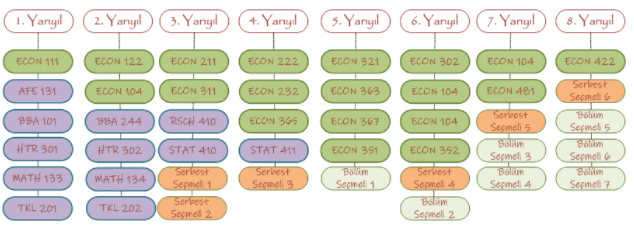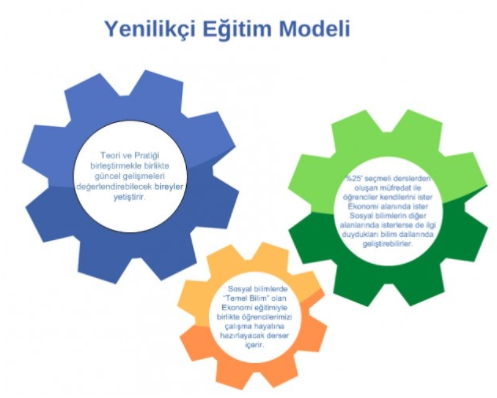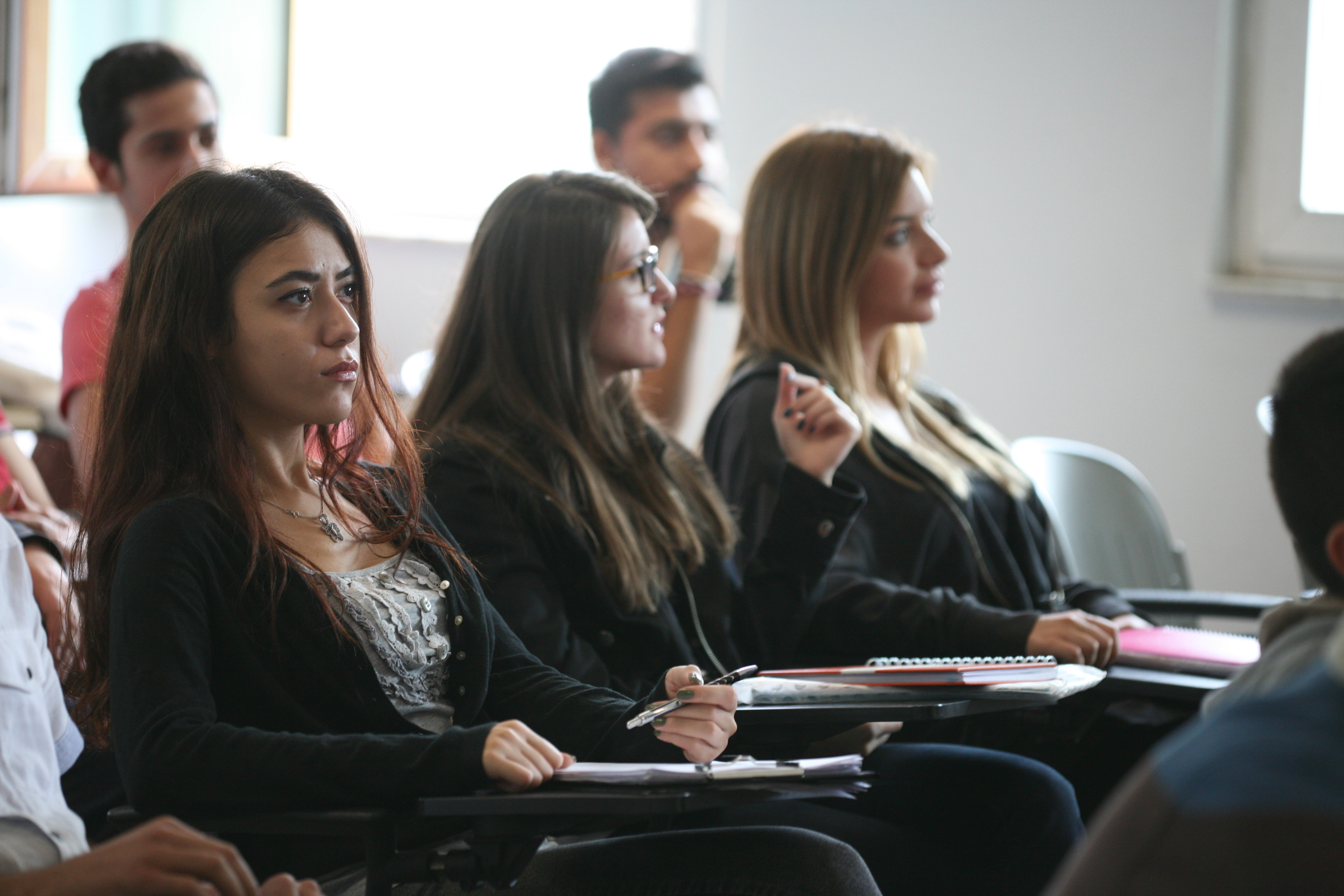Economics Department
In order for our department graduates to become individuals who make a difference in the developing global competitive environment, we provide opportunities for our students to develop themselves in their areas of interest / expertise. In this context, there are 2 different groups of elective courses in the academic program of the department. These courses constitute 27% of the department course load.
- Free Elective Courses: There are 6 free elective courses in the academic program. These courses can be chosen from any department at Yeditepe University. University elective courses can also be chosen instead of the Economics Department Area elective courses. If the course you want to choose is not on the list, the course you want can be added to the list as a result of a written application to the department until 2 weeks before the semester starts.
- Departmental Elective Courses: There are 7 departmental elective courses in the academic program and these courses consist of elective courses offered by the Department of Economics. The courses in the departmental elective list can also be selected as free elective courses.
Yeditepe Economics students have the opportunity to Double Major or Minor in many departments of the university. In this way, if they wish, students can graduate with two diplomas by studying the second department they prefer, or they can get an additional certificate to their diploma by doing a Minor in the department they prefer.
Students who graduate from Yeditepe Economics will be able to take part in government institutions, the private sector, especially in the Banking / Finance sector, and in the business world as entrepreneurs, as well as acquiring the basic knowledge and skills they will need in any Social Science branch they want to advance with their Master's and PhD education.
Hızlı Bilgiler
- Sunulan Derece: Ekonomi Lisans Diploması
- Minimum Mezuniyet Kredisi: 130
- Minimum Mezuniyet Ortalaması: 2.00
- Ekonomi Bölümünde ÇAP yapma imkanı var mı: Evet
- Ekonomi Bölümü Öğrencileri başka bölümlerde ÇAP yapabilir mi: Evet
- Ekonomi Bölümü Yandal imkanı sunuyor mu: Evet
- Ekonomi Bölümünün Erasmus anlaşmaları var mı: Evet
Vision
The vision of Yeditepe University Department of Economics is to be one of the leading departments of Economics in Turkey and the world with its education, training, scientific research and services to the society.
Mission
Our department is focused on adding value to society through education, research and service within the framework of continuous improvement principles. For this purpose:
Yeditepe Department of Economics offers undergraduate and graduate programs at contemporary international academic standards with the determination to educate individuals who are modern, enlightened and who have internalized universal values, who can understand and direct local and global economic developments, and who have leadership qualities.
It provides a working environment that supports the academic and professional development of its academic staff and the production and sharing of knowledge on national/international platforms.
It serves the society by cooperating with all kinds of national and international private businesses and public institutions and by supporting its students and faculty members to share their knowledge/experiences.
It maintains and reflects a contemporary, respectful, tolerant, innovative, entrepreneurial and participatory culture that supports personal development within the department, both among faculty members and students.
The Department of Economics started to provide education in 1996 with the establishment of our university. Our first graduates joined the working life in 2000. In 2001, when the move to the August 26 campus brought all faculties and departments of our university together, it enabled interdepartmental cooperation and interdisciplinary studies. Thus, the number of full-time faculty members increased and became suitable for the increasing number of students and the desired course diversification.
History
The Yeditepe University Department of Economics began accepting students in 1996, concurrently with the foundation of our university. It produced its first graduates in 2000. When the University moved to the 26 Ağustos Campus in 2001, all the university's faculties and departments were brought together in a specific location, allowing inter-departmental cooperation, interdisciplinary research, and a diversified pool of courses. As a result, the number of full-time faculty members has increased, as well as the number of students.
Our faculty members value scientific studies and develop new courses to ensure that economic education conforms to changing conditions. Graduate and doctoral education in economics is carried out within the department under the "General Economics" and "Political Economics" programs. As of 2015, the Yeditepe University Department of Economics boasts a total of 772 alumni, of which 756 are Undergraduate, 10 Master of Sciences and 8 Ph.Ds.
Previous Department Chairs:
What is the Department of Economics?
Economy refers to all the activities that people do in order to sustain their lives such as production, consumption, trade, distribution, import and export. The Department of Economics, on the other hand, aims to train individuals who can analyze the Turkish and world economy from a broad perspective by teaching students the logic of economic science. In order to be a student of the Department of Economics, it is necessary to graduate from the equal weight departments of high schools and make the university choice from TM-1 score type. Students who successfully complete 4 years of education receive a bachelor's degree in economics. Yeditepe University Department of Economics provides an efficient education with its expert academic staff to students who want to pursue an academic career and who want to work in private or public organizations.
Yeditepe University Department of Economics provides students with the knowledge and experience to interpret the Turkish and world economy. The courses of the Department of Economics aim to provide students with an analytical perspective. In addition to quantitative courses such as statistics, mathematics, and econometrics, courses such as History of Economic Thought, Turkish Economy and Public Finance aim to provide students with a thorough understanding of systematic and critical thinking. After graduation, students of the Department of Economics can continue their graduate education and pursue an academic career or start a professional career in the public and private sectors.


Studying Economics at
Yeditepe University
The main objective of Yeditepe University Economics undergraduate program is to train economists who can analyze economic developments in Turkey and the world and their socio-cultural consequences, analyze economic problems from an analytical point of view, have critical thinking and ethical values. In the curriculum of the Department of Economics, in addition to the basic knowledge of economics, a wide range of courses that support other fields of social sciences provide the development of students as a good economist. At the same time, students are offered the opportunity to study in two different fields such as Macroeconomics and Microeconomics, in which they can specialize in line with their interests. Yeditepe University provides compulsory internship opportunities for at least 40 working days to the students of the Department of Economics.
Before starting their professional careers, students have the opportunity to work in financial institutions to closely experience the knowledge they have learned in their courses, as well as to meet with the leading names of the professional business world and shape their careers. In order to provide students with new skills and increase their employment rates, the Department of Economics offers students the opportunity to double major and minor in other undergraduate programs within the university. At the same time, students can complete a semester of their education in the world's leading universities within the scope of the Erasmus+ program. Within the scope of the Economics Conferences held regularly every year, students have the opportunity to meet and benefit from the expertise of faculty members invited from Turkey and abroad, as well as being informed about theoretical issues.
What Does an Economics Graduate Do?
Where to Work?
Students who successfully graduate from the Department of Economics undergraduate program have a wide range of job opportunities in the public or private sector. Especially national or multinational companies often benefit from the expertise of economists while implementing their economic activities. They can work in companies as economic/financial consultants or in different positions in departments such as sales and marketing. Graduates can also find employment opportunities in the headquarters and branches of private and public banks.
Apart from banks, they can be employed in all financial market institutions and organizations in positions such as experts, assistant experts, inspectors, financial advisors, accountants, managers and management candidates. After graduation, graduates who succeed in public institution exams are employed in public institutions and organizations such as the Central Bank of the Republic of Turkey, Ministry of Economy, Undersecretariat of Treasury, Competition Authority, Capital Markets Board and Banking Supervision and Regulation Agency with the title of economist. Graduates with advanced foreign language skills have the opportunity to work in international organizations such as the World Bank (WB), United Nations (UN), International Monetary Fund (IMF). At the same time, graduates who continue their master's and doctoral studies after the economics undergraduate program have the opportunity to pursue an academic career.
Bologna Process
The Bologna Process is a reform process developed by many international organizations to create compatible higher education areas in Europe, to develop certain standards in the academic field, to implement these standards and to minimize the differences in the education system. The main objectives of the Bologna Process include educational attainment, transparency, mobility of students and academic staff, and international recognition of higher education institutions. The Bologna Process, which is a student-centered program, enables students to continue their education life in a much more active and conscious way. Yeditepe University Bologna Coordination Commission carries out its activities within the framework of national and international qualifications. As a result of the work that has been going on at our university since 2006, in 2012, the qualifications of all existing programs were determined by taking into account the Turkish Higher Education Qualifications Framework (TYYÇ) and professional and current standards, and by associating them with the learning outcomes of the courses, the teaching has become more planned and qualified.

Double Major and Minor Opportunities
Yeditepe University Department of Economics offers its students the opportunity to double major or minor in many departments within the university. In this way, students can have a second diploma if they prefer, or they can get an additional certificate to their diploma by participating in a minor program in a different field they want to specialize in. Application criteria for double major and minor programs, program attendance and completion requirements are specified in the Yeditepe University Associate and Undergraduate Education and Training Regulations.
Yeditepe Economics Department does not limit its students to the existing Minor/Match agreements. If our student wants to do a DMP / Minor with a department other than the departments listed below, he/she can apply to the department coordinator and request a DMP / Minor agreement between the two departments. However, it should be noted that it is not possible to do a DMP / Minor with exceptional Faculties / Departments such as Faculty of Medicine, Dentistry, School of Nursing. In order to do a DMP in the Department of Economics or to do a DMP in another department while you are a student of the Department of Economics, you can contact the department's DMP / Minor coordinator, Dr. Hatice Kerra Geldi, Department of Economics.
Our department currently has DMP agreements with 17 different departments.
| Faculty of Economics and Administrative Sciences | Political Science and International Relations (English) |
| Political Science and International Relations (French) | |
| Business Administration | |
| Public Administration | |
| Information Systems and Technologies | |
| International Finance | |
| International Trade and Business | |
| Faculty of Computer and Information Sciences | Management Information Systems |
| Faculty of Engineering | Industrial and Systems Engineering |
| Civil Engineering | |
| Faculty of Arts and Sciences | Psychology |
| Mathematic | |
| Sociology | |
| Faculty of Fine Arts | Gastronomy and Culinary Arts |
| Fashion and Textile Design | |
| Faculty of Communication | Journalism |
| School of Applied Sciences | Real Estate Development and Management |
